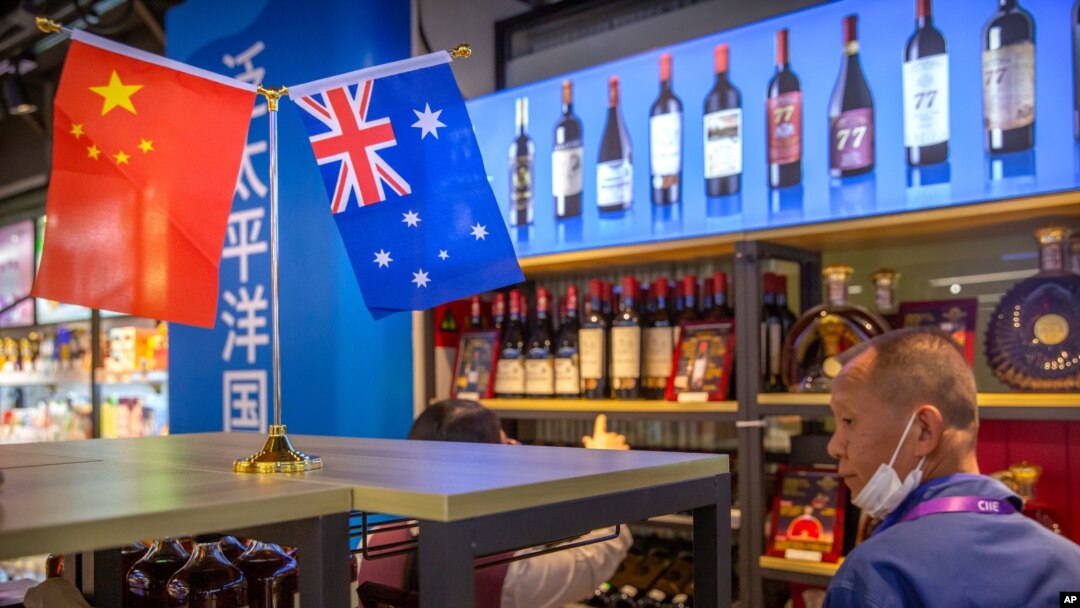Beijing announced Friday that wine producers in Australia will be subject to 107.1% to 212.1% “guarantee money” in order to sell to the Chinese market.
This “anti-dumping measure,” as Chinese authorities put it, will take effect Saturday and is seen as Beijing’s latest punishment to Canberra in retaliation for Australia’s stance toward the Communist Party-run state.
Australia is China’s second-largest supplier of wine, after France, according to Australian statistics. The two nations have a free trade agreement that took effect in December 2015 and eliminated the 14% to 20% tariffs on wine last year.
Beijing’s behavior is “completely incompatible with the commitments that China has given through the China-Australia free trade agreement and through the World Trade Organization,” Australian trade officials warned.
Meanwhile, some people around the world have decided to lend Australia a hand as it battles Beijing.
Citizen wine diplomacy
Edward Lucas, a London-based international affairs expert, launched a campaign on Twitter, encouraging people to buy Australian wine.
In a phone interview from London, Lucas was overjoyed with the response.
“That’s the most successful tweet I’ve ever had – in terms of engagements, impressions, whatever it is they measure it by,” he said.
Andreas Fulda, a vocal critic of Beijing’s coercive policies, showcased his first purchase in a tweet.
Florian Wagner, a German office worker in his late 30s from North Rhine-Westphalia, told VOA why he joined, saying he “cares about China-Australia relations because China tried a divide-and-conquer strategy against the West. If I can help protect against that threat by drinking a bottle of wine once in a while – great.”
Wolf warrior diplomacy could backfire
While Australia is on the receiving end of mounting pressure from Beijing, Lucas and others pointed out that Beijing’s punitive approach could also hurt China.
“The danger of this [to China] is other countries notice. You can’t simultaneously say China is a peaceful country that never picks fight with people, and then simultaneously say if Australia doesn’t change its political system, legal system, foreign policy, education system, and everything else, we’ll never normalize relations. I think this wolf warrior diplomacy is inherently self-defeating, really,” Lucas said.
Before the Australian wine saga, Chinese authorities held up 20 tons of live lobsters from Australia, supposedly to test metal levels. And then problems were found in Australian timber.
What China is doing to Australia should be a lesson to other countries that trade with Beijing, wrote Mihir Sharma, in a recent Bloomberg column.
“It will cost money to find markets outside of China or suppliers more efficient than those on the mainland. It will be complicated to defend resources that Beijing might otherwise exploit to its advantage.”
“But, if that money is not spent and those efforts aren’t made now,” he continued, “the cost of dependence down the road will be that much higher.”
Australia united on sovereignty
Australia is an export-oriented nation that lives by trade, said Senator Kimberley Kitching, a member of the opposition Labor Party.
“It is a shame that in recent decades we have allowed ourselves to become so dependent on one country to receive our goods,” she told VOA in a written interview from Melbourne. Kitching chairs the Australian Senate Foreign Affairs, Defense and Trade References Committee and is the Australian co-chair of the Inter-Parliamentary Alliance on China.
Senator Kimberley Kitching, a member of Australia’s Labor Party, chairs the Foreign Affairs, Defense and Trade References Committee in the Australian Senate. (Photo courtesy Office of Senator Kimberley Kitching)
“But we should look at this as an opportunity to diversify our trade portfolio,” she continued.
In fiscal 2018-19, China was Australia’s largest two-way goods and services trading partner, accounting for about 26% of Australia’s trade, followed by Japan, the United States, South Korea, Singapore and New Zealand.
“I worry that some in the Chinese government and Foreign Ministry grossly underestimate the damage some of their actions and statements have had in the way the Australian public perceives them,” Kitching said. “Their recent list of demands and grievances against Australia is one of the more revealing and counterproductive documents I’ve seen for many years.”
The story of how Chinese authorities handed a 14-point list of grievances with Australia to an Australian reporter made headlines around the world since the news broke last week.
Rory Medcalf, a professor and head of National Security College at the Australian National University and author of Contest for the Indo-Pacific, called it “unfortunate.”
“If the Chinese government deliberately leaked this list of supposed Australian transgressions, and called for corresponding policy changes, it further reduces any scope for adjustment. Face matters in this country, too,” he added.
The view that Australia should not allow a foreign government to dictate its values and beliefs is shared by the entire Australian government, Kitching told VOA.
In the wake of the 14-point demands from Beijing, Australia’s Department of Foreign Affairs and Trade issued a statement that Canberra “is always ready to talk directly in a constructive fashion about Australia’s relationship with China."
Beijing warns of a ‘walk into the dark’
A recent editorial in the Global Times, part of China’s state media, warned “If Canberra cannot reflect on its previous moves against China and make adjustments, improving China-Australia relations will be far from visible. At that time, Australians will know how it feels like to walk into the dark.”
Kitching said she sees that as a losing gambit.
“Australia is an open-hearted country that welcomes visitors, students, investors and immigrants from everywhere,” she said. “But if any foreign government tries to make silent obedience a condition to trade, then there is essentially zero Australian public support for that.”


